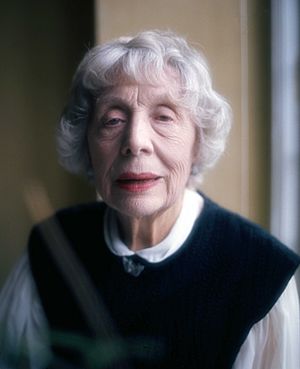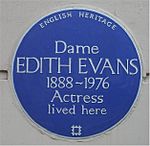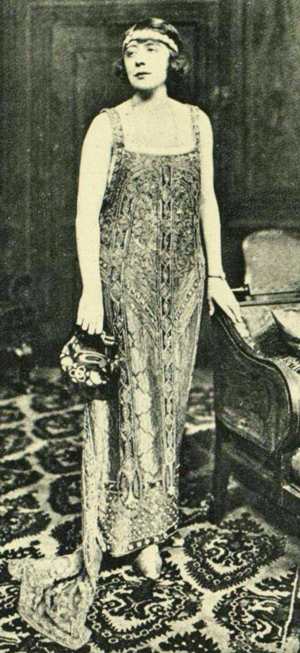Edith Evans facts for kids
Quick facts for kids
Edith Evans
|
|
|---|---|

Dame Edith Evans in a 1972 portrait
|
|
| Born |
Edith Mary Evans
8 February 1888 |
| Died | 14 October 1976 (aged 88) Cranbrook, Kent, England
|
| Occupation | Actress |
| Years active | 1910–1976 |
| Spouse(s) |
George Booth
(m. 1925; d. 1935) |
Dame Edith Mary Evans (born February 8, 1888 – died October 14, 1976) was a famous English actress. She was known for her amazing work on stage. She also acted in movies, especially at the start and end of her career. Between 1964 and 1968, she was nominated for three Academy Awards.
Edith Evans's stage career lasted for sixty years. She played over 100 different characters. These included roles in classic plays by Shakespeare, Congreve, and Wilde. She also performed in plays by newer writers like Bernard Shaw. She even created new roles in two of Shaw's plays.
Evans became very famous for playing proud, upper-class women. Two of her most well-known roles were Lady Bracknell in The Importance of Being Earnest and Miss Western in the 1963 film Tom Jones. When she played Lady Bracknell, her way of saying the line "A handbag!" became very famous. But she also played many different types of characters. For example, she was a poor maid in The Late Christopher Bean (1933). She also played an old, confused woman in The Whisperers (1967). One of her most loved roles was Nurse in Romeo and Juliet. She played this part four times between 1926 and 1961.
Contents
Life and career
Early years
Edith Evans was born in Pimlico, London. Her father, Edward Evans, worked for the post office. Her mother was Caroline Ellen Foster. Edith had one brother, but he died when he was four years old.
She went to St Michael's Church of England School. At age 15, in 1903, she started training to be a milliner. A milliner makes hats. Edith later said she loved the beautiful fabrics. But she found it hard to make two hats exactly the same.
While working in a hat shop, she started taking drama classes. These classes grew into an amateur acting group. It was called the Streatham Shakespeare Players. She first acted on stage with them in October 1910. She played Viola in Twelfth Night.
In 1912, she was playing Beatrice in Much Ado About Nothing. A producer named William Poel saw her. He gave her her first professional acting job in August 1912. She played Gautami in an old Hindu play called Sakuntalá. After that, Poel cast her as Cressida in Troilus and Cressida. A newspaper critic said her speaking was not perfect. But they still liked her performance.
Edith Evans first acted in London's West End in 1913. It was in a play called Elizabeth Cooper. The play itself was not very good. But Evans was praised. Critics said she put more into her small part than many famous actors did in main roles. In January 1914, she played Gertrude in Hamlet. This was her first professional Shakespeare role.
In 1914, she got a one-year contract with the Royalty Theatre. She played different characters in comedies. She was a junior member of the cast. Over the next ten years, she improved her acting skills. She acted in two silent films in 1915. These were A Welsh Singer and A Honeymoon for Three. She also appeared in East is East in 1917. After that, she did not make any more films for over thirty years.
She toured with Ellen Terry's Shakespeare company in 1918. She also acted with a young Noël Coward in Polly With a Past (1921). She played five new roles in plays by Shaw. In 1922, she had a big success in a comedy called The Laughing Lady.
Becoming a star
By this time, critics knew Edith Evans well. They often gave her great reviews. In 1924, she played Millamant in The Way of the World. This role made her widely famous for the first time. She played a strong and clever character.
A famous critic, James Agate, called her "the most accomplished of living and practising English actresses." Another writer, Arnold Bennett, said her Millamant was the best comedy performance he had ever seen. Other actors were also very impressed by her.
In 1925–26, Evans joined the Old Vic theatre company. She played many Shakespeare roles there. These included Portia, Cleopatra, and Katherina. She also played Nurse in Romeo and Juliet, which became one of her most famous parts. The schedule was very busy. She said she lost a lot of weight. She also got married on her only free day from rehearsals.
Her husband was George (Guy) Booth. He was an engineer and she had known him for over twenty years. They did not have any children. Being married to someone outside the theatre suited Evans. She did not like the gossip and drama that some actors enjoyed.
Looking back at her career, The Times newspaper said that the twenty years after her success as Millamant showed her wide range of talent. They mentioned her great performances in plays like Tiger Cats (1924) and The Beaux' Stratagem (1927). In 1929, she played Orinthia in The Apple Cart. Shaw wrote this role especially for her.
In the 1930s, she acted in several shows in New York. Some of these shows moved from London. Others were new. While she was in New York, her husband died suddenly in London. She was very sad. Her friends encouraged her to focus on her work, which helped her cope.
Important roles for Evans in the 1930s included Gwenny in The Late Christopher Bean (1933). She also played four more Shakespeare parts. In 1939, she played Lady Bracknell in The Importance of Being Earnest. She played this role on and off for seven years. She toured with it and performed in London. By 1947, she did not want to act in the play on stage anymore. She played Lady Bracknell in a film (1952) and on television (1960). But she never played her on stage again.
During World War II, Evans joined a group called ENSA. They traveled to Gibraltar to entertain soldiers. The next year, she played Hesione Hushabye in Heartbreak House. She toured for ENSA in Britain, Europe, and India in 1944 and 1945. After the war, she played Mrs Malaprop in The Rivals. Critics did not love this show. Evans's performance was respected, but not as highly praised as some of her others.
After the war
Edith Evans played Cleopatra in Shakespeare's play for the last time in 1946–47. She was in her late fifties. Critics had different opinions about her performance. Some called it "an agonising disaster." Others said it was "a joy to watch."
Evans was not known for being beautiful in a classic way. But she was such a great actress that she could "convey beauty without being conventionally beautiful." Some people, including other actors, felt that tragedy roles were harder for her than comedy roles. She often refused to play very sad Shakespeare roles, like Lady Macbeth. She told a friend, "I could never impersonate a woman who had such a peculiar notion of hospitality." This meant she could not understand the character's evil nature.
Evans once said, "I don't think there is anything extraordinary about me except this passion for the truth." This meant she needed to understand a character deeply. She told Shaw that she had been asked to play Volumnia in Coriolanus. But she said, "isn't she a bloodthirsty old harridan? I could never play her." This did not mean she had to like the characters. But she had to understand them. When she first read the role of Lady Bracknell, she said, "I know those sort of women. They ring the bell and tell you to put a lump of coal on the fire."

In 1948, Evans returned to making films. She had not made a film for over thirty years. She appeared in The Last Days of Dolwyn. The cast included Richard Burton, who was in his first film. Critics liked her performance. But one reviewer wondered if she was fully comfortable in front of the camera yet. In the same year, she played Countess Ranevskaya in the film The Queen of Spades.
In the theatre, Evans returned to The Way of the World in 1948. This time, she played the strong old Lady Wishfort. Her performance was much admired. In November of the same year, she played Ranevskaya in Chekhov's The Cherry Orchard. Again, opinions were mixed. Some critics called her performance "glorious." Others felt she did not fully connect with the character.
Over the next ten years, Evans acted in only six stage plays. This was because she was in long-running shows in London's West End. From 1949 to 1950, she played Lady Pitts in Daphne Laureola. This show was in London and New York. She also played Helen Lancaster in Waters of the Moon, which ran for over two years. In 1954, she played Countess Rosmarin Ostenburg in The Dark Is Light Enough. From 1956 to 1957, she was Mrs St Maugham in The Chalk Garden.
In 1958, she returned to the Old Vic company. She played Queen Katharine in Henry VIII. She performed this in London and at the Shakespeare Memorial Theatre. In 1959, she played the Countess of Rousillon in All's Well That Ends Well. She also played Volumnia in Coriolanus, even though she had said she would not. In the 1950s, she made three films. These were The Importance of Being Earnest (1952), Look Back in Anger (1959), and The Nun's Story (1959). In The Importance of Being Earnest, she famously said "A handbag?" in a very dramatic way.
1960s and 1970s
In 1960, Evans played Judith Bliss in a TV show called Hay Fever. In 1961, she played Queen Margaret in Richard III. She also played the Nurse in Romeo and Juliet for the last time. In 1963, she played Violet in Gentle Jack. In 1964, she returned to the role of Judith Bliss in Hay Fever for the National Theatre.
Her films from the early 1960s included Tom Jones (1963), The Chalk Garden, and Young Cassidy (both 1964).
Her biggest film role in the 1960s was Mrs Ross in The Whisperers (1967). For this role, she was nominated for an Oscar. She also won five other major awards. After that, she had supporting roles in ten more films. When she was 87, she played the Dowager Queen in The Slipper and the Rose (1975). In this film, she even sang and danced!
Evans's last stage roles were Mrs Forrest in The Chinese Prime Minister (1965) and Carlotta in Dear Antoine (1971). When learning new roles became too difficult, she performed a show called Edith Evans and Friends. It was a collection of stories, poems, and music. She gave her final performance in London's West End in this show on October 5, 1974. Her last public appearance was on a BBC radio show in August 1976. A writer for The Guardian said she was frail. But he noted she could still give words "an imperious or serene grandeur."
Bryan Forbes, who directed Edith Evans in some films, wrote her biography. It was called Ned's Girl and came out in 1977.
Edith Evans died at her home in Cranbrook, Kent, on October 14, 1976. She was 88 years old.
Honours
Edith Evans was given the title of Dame Commander of the Order of the British Empire (DBE) by King George VI in 1946. This is a very high honour in Britain.
Awards
Evans received special degrees from several universities. These included the University of London (1950), Cambridge (1951), Oxford (1954), and Hull (1968).
The artist Walter Sickert painted Evans as Katharina in Shakespeare's The Taming of the Shrew. For many years, a sculpted head of Evans was shown at the Royal Court Theatre. In 1997, a blue plaque was placed outside her home in London. This plaque remembers famous people who lived there.
Academy Awards
Edith Evans was nominated for an Academy Award three times.
| Year | Award | Title of work | Result |
|---|---|---|---|
| 1964 | Best Supporting Actress | Tom Jones | Nominated |
| 1965 | The Chalk Garden | Nominated | |
| 1968 | Best Actress | The Whisperers | Nominated |
Other film acting awards
Edith Evans won several other awards for her film acting. The National Board of Review (NBR) named her Best Supporting Actress for The Nun's Story in 1959. The NBR also gave her the Best Supporting Actress award for The Chalk Garden in 1964. She won Best Actress for The Whisperers in 1967. Her role in The Whisperers also earned her awards from the British Film Academy, the Hollywood Foreign Press Association, and the New York Film Critics Circle.
See also
 In Spanish: Edith Evans para niños
In Spanish: Edith Evans para niños
- List of actors with Academy Award nominations
 | Shirley Ann Jackson |
 | Garett Morgan |
 | J. Ernest Wilkins Jr. |
 | Elijah McCoy |


